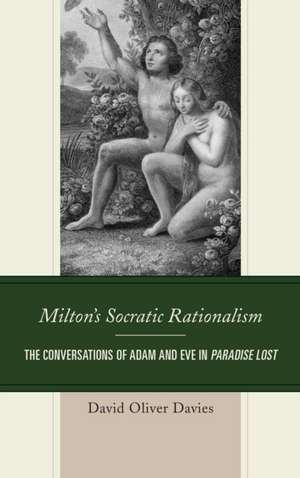MILTONS SOCRATIC RATIONALISMTPB: Politics, Literature, & Film
Autor David Oliver Daviesen Limba Engleză Paperback – 10 feb 2020
Din seria Politics, Literature, & Film
- 19%
 Preț: 613.37 lei
Preț: 613.37 lei - 23%
 Preț: 649.97 lei
Preț: 649.97 lei - 23%
 Preț: 648.80 lei
Preț: 648.80 lei -
 Preț: 348.60 lei
Preț: 348.60 lei - 23%
 Preț: 650.27 lei
Preț: 650.27 lei - 23%
 Preț: 688.79 lei
Preț: 688.79 lei -
 Preț: 408.51 lei
Preț: 408.51 lei - 27%
 Preț: 683.78 lei
Preț: 683.78 lei - 23%
 Preț: 649.54 lei
Preț: 649.54 lei -
 Preț: 353.98 lei
Preț: 353.98 lei - 23%
 Preț: 648.50 lei
Preț: 648.50 lei - 27%
 Preț: 677.84 lei
Preț: 677.84 lei - 23%
 Preț: 686.27 lei
Preț: 686.27 lei - 27%
 Preț: 817.30 lei
Preț: 817.30 lei - 23%
 Preț: 613.07 lei
Preț: 613.07 lei -
 Preț: 366.40 lei
Preț: 366.40 lei -
 Preț: 375.53 lei
Preț: 375.53 lei - 23%
 Preț: 650.27 lei
Preț: 650.27 lei - 23%
 Preț: 561.15 lei
Preț: 561.15 lei - 23%
 Preț: 646.71 lei
Preț: 646.71 lei - 27%
 Preț: 715.70 lei
Preț: 715.70 lei - 23%
 Preț: 683.62 lei
Preț: 683.62 lei - 23%
 Preț: 651.78 lei
Preț: 651.78 lei - 23%
 Preț: 649.09 lei
Preț: 649.09 lei - 23%
 Preț: 685.56 lei
Preț: 685.56 lei - 23%
 Preț: 649.68 lei
Preț: 649.68 lei -
 Preț: 416.33 lei
Preț: 416.33 lei -
 Preț: 398.25 lei
Preț: 398.25 lei - 23%
 Preț: 635.64 lei
Preț: 635.64 lei - 23%
 Preț: 687.15 lei
Preț: 687.15 lei - 23%
 Preț: 649.97 lei
Preț: 649.97 lei - 23%
 Preț: 684.35 lei
Preț: 684.35 lei - 23%
 Preț: 606.81 lei
Preț: 606.81 lei -
 Preț: 368.40 lei
Preț: 368.40 lei - 23%
 Preț: 648.05 lei
Preț: 648.05 lei -
 Preț: 372.05 lei
Preț: 372.05 lei -
 Preț: 361.79 lei
Preț: 361.79 lei - 27%
 Preț: 680.66 lei
Preț: 680.66 lei - 23%
 Preț: 683.76 lei
Preț: 683.76 lei -
 Preț: 352.02 lei
Preț: 352.02 lei - 23%
 Preț: 690.29 lei
Preț: 690.29 lei - 23%
 Preț: 687.91 lei
Preț: 687.91 lei - 23%
 Preț: 686.57 lei
Preț: 686.57 lei -
 Preț: 415.76 lei
Preț: 415.76 lei - 23%
 Preț: 601.13 lei
Preț: 601.13 lei - 23%
 Preț: 660.66 lei
Preț: 660.66 lei
Preț: 342.35 lei
Nou
Puncte Express: 514
Preț estimativ în valută:
65.52€ • 68.15$ • 54.09£
65.52€ • 68.15$ • 54.09£
Carte tipărită la comandă
Livrare economică 14-28 aprilie
Preluare comenzi: 021 569.72.76
Specificații
ISBN-13: 9781498532648
ISBN-10: 1498532640
Pagini: 196
Dimensiuni: 152 x 229 x 17 mm
Greutate: 0.3 kg
Editura: Rowman & Littlefield
Seria Politics, Literature, & Film
ISBN-10: 1498532640
Pagini: 196
Dimensiuni: 152 x 229 x 17 mm
Greutate: 0.3 kg
Editura: Rowman & Littlefield
Seria Politics, Literature, & Film
Notă biografică
By David Oliver Davies
Descriere
Milton's Socratic Rationalism focuses on the influence of Milton's years of private study of classical authors, chiefly Plato, Xenophon and Aristotle, on Paradise Lost. It examines the conversations of Adam and Eve as a mode of discourse closely aligned to practices of Socrates in the dialogues of Plato and eponymous discourses of Xenophon.
